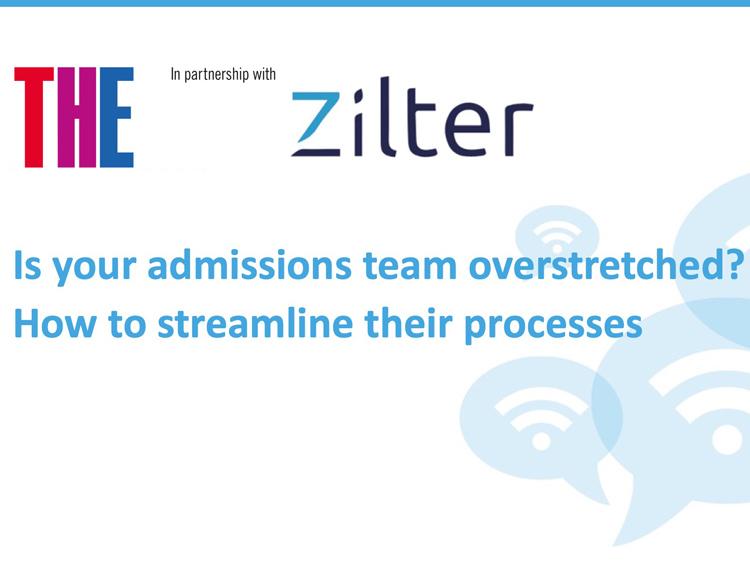
Improving admissions: how to evaluate the whole student
When a student is evaluated for admission to a college or university, a standardised rubric/template checklist is usually utilised. Potential students’ applications at some schools are first reviewed based on their presented grade point average (GPA) and test scores (SAT, ACT and/or TOEFL) prior to even being moved into a general applicant pool for further review. If a student lacks in one area or the other, they could be placed on the waiting list – or simply declined admission.
But we all know there are students who excel in the classroom yet struggle with their test-taking abilities. Of course, other students may be exceptional test takers but lack focus and passion in the classroom. Meanwhile, some students cannot afford to participate in extracurriculars such as test prep courses and tutoring or staying for club or sport activities, often for socio-economic reasons and/or because they need to get to their jobs to earn income for their family. So, why are such situations not always part of a holistically considered evaluation for all students?
Admittedly, some colleges and universities have started to move away from this method, but the majority are still using the “plug-and-play” method for admissions. In addition, who is to say that those institutions that are moving away from the standard are evaluating other factors? There needs to be a more all-inclusive approach to evaluating the student. From our experience, there are several key factors that should be considered:
Grade point average (GPA)
Looking at how the student performs in the classroom clearly has to remain one aspect of the process. But as mentioned earlier, some students may have had other circumstances that caused poor performance. So, while GPA is a focus, it should not be weighted more than other elements and should be seen as part of the whole package and story of the student. Considering a student’s explanation as to what caused a trajectory decline in a single class or entire semester is vital.
Rigour of secondary education coursework
When viewing an application, it’s important to see the rigour and intensity of the transcript classes as well as the patterns of achievement. Do they align with the major the student intends to pursue? Do they meet the college’s minimum requisites, or would the student need to take prep courses first? They may even have advance placement or other college classes taken through specific programmes.
All this needs to be reviewed, as does what could make a student lack some of these courses. Perhaps opportunity was not present, yet the potential is still there (possibly documented in recommendations from the applicant’s teachers).
Community service contributions
Participating in the community also demonstrates character. After all, we cannot just look at stats but who the applicant is as a person. Giving back to the community, as well as involvement in meaningful organisations that help others, demonstrates the level of devotion they might have when in the college community.
Participation in teams, clubs, student government, etc.
Community involvement is a fantastic way to engage, but being on a school team, club or similar for years shows dedication and commitment. Noting if a student was in a leadership role or a captain exemplifies their capabilities in challenging settings, and this can be a prelude to what the individual would bring to campus in the form of spirit and enthusiasm. Again, though, it is important to find out if someone lacked opportunity, not drive.
Honours/awards/student recognition
Highlighted achievements are important for many reasons. Although someone may lack in one area, they could also have perfect attendance, which shows consistency. While student of the month, for example, shows commitment to the school and those around them.
Employment
Some students may work part-time or even close to full-time while attending high school. Employment can be viewed the same way as a sport, club or community contribution, but remember there could be family responsibilities that fall on the student. Some are in a socio-economic position where they need to provide for their family. The inability to participate in extracurriculars should not be a burden on the student for college applications.
Essay
Whether applying directly to a school or utilising the Common App, most routes require an essay. The evaluation of the essay should be twofold: which question did they pick; and how is their writing? The ability to answer the question is crucial, as is making that answer flow. Did they pick a common question? One that was easy? Or did they take a risk? Varying perspectives will generate a more diverse pool of accepted students.
Viewing uploaded documents
On the Common App, students can upload documents. A student should have the ability to submit a portfolio, like an art student would. If they choose to apply for engineering, being able to submit their blueprints for a robot they built shows certain capabilities. A student applying for business might have, for example, participated in a stock market competition. If so, they can show their portfolio. The list goes on.
Remember: every student is different. Admissions is not just about viewing the numbers and who fits into which box. It needs to be more about who the student is, what they are capable of and whether they are the right fit for your institution.
Brooke Wilson is a credit and risk management professional alongside her work in academia as an adjunct professor. She serves as a faculty member for CSU Global’s MBA programme.
Karin-Jill Magaziner Schneider is a school psychologist, cognitive behavioural therapist and college consultant. Her college consulting business evolved from years as an educator in K-12 schools and as an academic at a City University of New York college.
If you found this interesting and want advice and insight from academics and university staff delivered direct to your inbox each week, sign up for the THE Campus newsletter.




